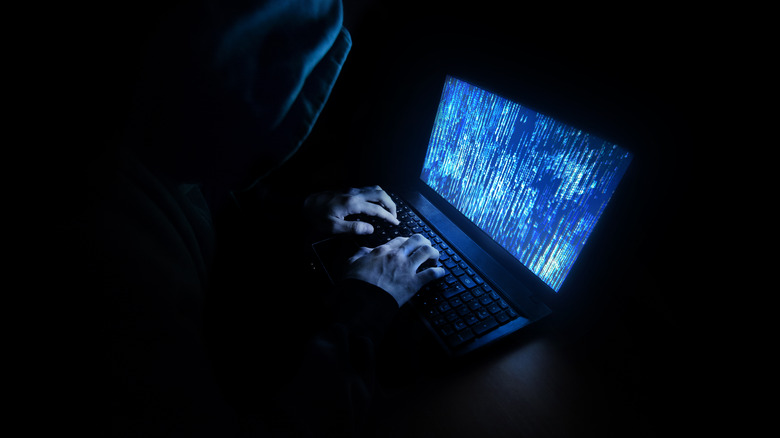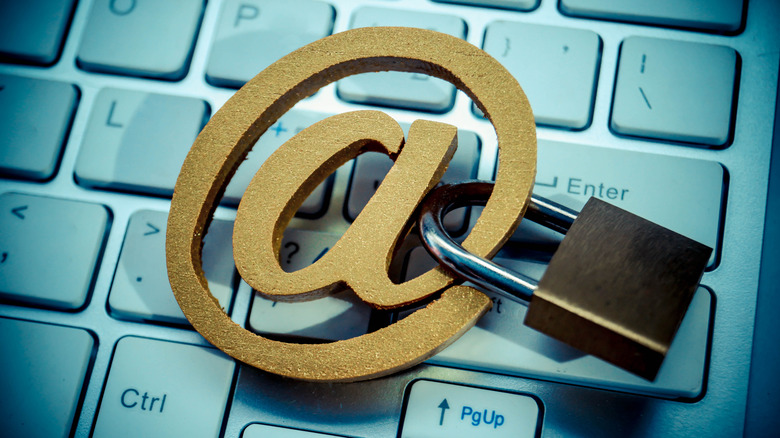The Cunning Trick Elon Musk Used To Catch A Leaker
Elon Musk has revealed a clever trick he used to discover who was leaking Tesla emails to the press over a decade ago. The revelation comes after Musk sent a midnight email to large numbers of Twitter staff entitled "A Fork in the Road." The email told employees they have to be more "hardcore" if Twitter is to "succeed in an increasingly competitive world." Staff members who receive the email have been given until 5 p.m. Eastern Time on Thursday, November 16, to accept the terms, otherwise, they will receive the same three-month severance package given to employees who lost their job during Twitter's recent mass layoff.
Some employees may accept the new challenge, especially as other big tech companies have made layoffs of their own and frozen hiring. Others may see it as a way out. A large number of Twitter staff members seem disgruntled following the takeover, and several who have criticized Musk, his company, or the actions he has taken since buying the social media platform, have been fired.
The discontent amongst the remaining staff also means leaks detailing Musk's actions and plans have become quite common. The "Fork in the Road" email is no exception, and multiple news organizations had access to it shortly after Twitter's employees received it in their inboxes. However, if Musk's previous actions are anything to go by, this particular leak could cost the employee or employees responsible dearly.
Musk claims to have used a code to find a leak
Earlier today, Musk responded to a tweet asking him about how a data breach at Tesla was handled. The incident, which allegedly occurred in 2008, appeared to involve an employee who was leaking confidential company data to the press in exchange for money. Musk seemed to confirm the story and expand on it. After describing the events as "quite interesting," he went on to say: "We sent what appeared to be identical emails to all, but each was actually coded with either one or two spaces between sentences, forming a binary signature that identified the leaker."
That is quite an interesting story. We sent what appeared to be identical emails to all, but each was actually coded with either one or two spaces between sentences, forming a binary signature that identified the leaker.
— Elon Musk (@elonmusk) October 9, 2022
There is no confirmation or suggestion that a similar code was worked into the mass email Twitter sent out this morning. It is also worth noting that the incident at Tesla will have involved a handful of initial "suspects" as opposed to the thousands of employees who may have received this morning's emails. According to Forbes, Tesla only had 363 employees that year and not all of them would have had access to confidential company data. While it is unlikely any kind of code was worked into this morning's email, it is still possible.
The email itself contained roughly 839 characters and 143 words. Very subtle changes to spacing and punctuation could be added to form thousands of different, but incredibly similar-looking emails. Deliberate typos could also be used, though they may be easier to pick up on. Although many of the employees will choose to take the severance package and will be glad to be free from Musk, if one of them leaked the email and Musk can prove it, there could be dire consequences.
Employees at Twitter could have a reason to be worried
If an employee intends to leave anyway, Musk's disciplinary options short of a lawsuit are limited. Internal emails are often considered confidential, and many companies have a footnote confirming as much added to their internal emails as standard. So even if you're asking a colleague about lunch options, the email itself may have words similar to the following in it somewhere: "This e-mail and any files transmitted with it are the property of [company name], are confidential, and are intended solely for the use of the individual or entity to whom this email is addressed and/or as indicated in the applicable file."
Beware of reproducing possible typos or pasting directly the text which may include repeated characters. He used that before to identify leakers at Tesla.
— Nico H (@pnikosis) November 16, 2022
Leaking confidential company documents is grounds for dismissal, and firing the employee responsible for the cause would be very straightforward. Musk has also fired Twitter employees on far shakier ground since taking charge of the company, and terminated others for disparaging him or his new business. Some Twitter users have picked up on the risk of Musk identifying the employee who leaked the email.
Replying to a tweet by Gergely Orosz, one of the writers who initially brought the email to public attention, "Nico H" highlighted the importance of correcting typos and not copying the text directly when transcribing leaks. In an extreme case, a breach of confidentiality can lead to a lawsuit. As UpCounsel explains, an employee can be sued for breach of confidentiality if the employer can prove it suffered monetary damages as a result of the leak. But Musk may have a hard time proving that the leak damaged Twitter's reputation and the company lost money as a result, especially considering how much Musk's actions may have cost the firm in recent weeks.


